Custom Shoes Market Research, 2035
The global custom shoes market size was valued at $5.2 billion in 2023, and is projected to reach $8.6 billion by 2035, growing at a CAGR of 4.3% from 2024 to 2035. Custom shoes are specially designed footwear that match individual preferences in style, fit, and function. They are made through AI-driven foot scans, 3D models, and skilled craftsmanship. Customers select materials, colors, and details to create a unique design. Custom shoes provide better comfort, improve performance for athletes, and address orthopedic needs. Shoes customized as per consumer preferences ensure a precise fit and exclusivity, as it offers an alternative to mass-produced footwear that lacks personalization.
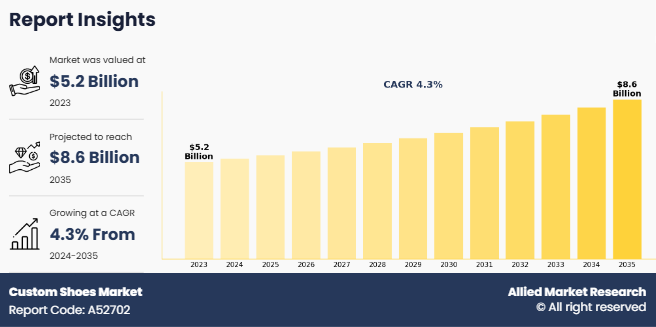
Market Dynamics
Growth in demand for personalized and unique footwear has significantly driven global custom shoes market growth in recent years. Consumers are prioritizing shoes that align with individual preferences, including color selection, material choices, and bespoke sizing. Social media platforms and fashion influencers have played a major role in shaping purchasing decisions, with brands offering tailored designs that stand out. Luxury and high-end fashion brands have responded by integration of customization services, that cater to those willing to invest in distinct and premium footwear. Rising disposable income and evolving fashion trends are further encouraging consumers to seek footwear that reflects personal style and exclusivity, thus driving the growth of market.
Moreover, e-commerce platforms and direct-to-consumer sales models have made customized footwear more accessible to a broader audience. The ability to order shoes tailored to specific requirements without visiting physical stores has expanded purchasing options. Custom sports and performance footwear are also gaining traction, with professional athletes and fitness enthusiasts opting for shoes designed to enhance comfort and functionality. Consumers seeking limited-edition designs and collaborations with designers or celebrities are further contributing to global custom shoes market share expansion. Demand for customization is expected to strengthen as exclusivity and personal expression remain key factors influencing purchasing decisions.
Even though the market has experienced rapid growth, factors such as high production costs and pricing constraints have hindered the growth of the custom shoes market. Advanced manufacturing processes, including digital printing and 3D shoe customization, require significant investment in technology, materials, and skilled labor. The complexity of producing custom shoes on a made-to-order basis increases expenses compared to mass-produced alternatives. Luxury footwear remains less affected, but many mid-range and budget-conscious consumers may find personalized shoes less accessible owing to higher pricing. The use of premium materials and specialized production techniques further raises costs of custom shoes, restricting affordability for a wider audience in the global market.
Also, pricing challenges affect overall market expansion, as consumers often compare custom shoes with standard footwear available at lower prices. Limited economies of scale prevent manufacturers from significantly lowering costs, which keeps customization options within a niche market. Higher price points reduce purchasing frequency, leading many consumers to prioritize traditional footwear over personalized alternatives. Without competitive pricing structures, the demand for customized footwear remains constrained, particularly among price-sensitive buyers seeking cost-effective options, thus hampering the custom shoes market expansion.
Furthermore, the adoption of augmented reality (AR) for virtual try-ons is creating significant opportunities in global custom shoes marketby improving the digital shopping experience and increasing consumer confidence in personalized footwear. AR technology allows shoppers to visualize custom designs in real time, adjusting colors, materials, and styles before completing a purchase. This interactive approach reduces uncertainty, leading to higher engagement, lower return rates, and improved customer satisfaction. Brands that integrate AR-powered try-ons gain a competitive edge by offering a more immersive and convenient shopping experience.
In addition, expanding AR capabilities is shaping global custom shoes market demand, driving demand for personalized footwear and digital customization tools. Younger consumers who prioritize seamless online shopping experiences show strong interest in brands that offer interactive design and purchasing features. The data collected from AR interactions helps brands refine product offerings based on consumer preferences. Investment in AR-driven customization continues to grow, increasing accessibility to custom footwear and supporting the expansion of digital innovations in the market during the custom shoes market forecast.
Market Segmentation
The custom shoes market is divided into product type, material, distribution channel, and region. Based on product type, the market is segmented into athletic shoes, casual shoes, formal shoes, luxury shoes, and others. Based on material, the market is categorized into leather, synthetic, textile, rubber, and others. Based on distribution channel, the market is bifurcated into offline and online. By region, the market is analyzed across North America (U.S., Canada, and Mexico), Europe (Germany, UK, France, Italy, Spain, and rest of Europe), Asia-Pacific (China, Japan, India, South Korea, Australia, Singapore, and rest of Asia Pacific), and LAMEA (Brazil, Argentina, South Africa, Saudi Arabia, UAE, and rest of LAMEA).
By Product Type
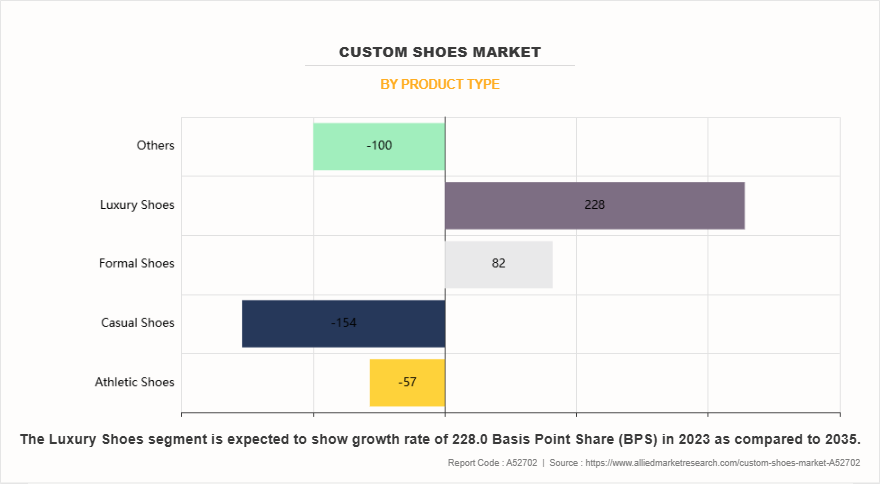
By product type, the athletic shoes segment dominated the global custom shoes market in 2023 and is anticipated to maintain its dominance during the forecast period. Rise in consumer demand for personalized footwear designed for comfort, fit, and performance has contributed to market expansion of this segment. Advancements in 3D printing and AI-driven customization have enabled brands to offer tailored solutions for athletes and casual users. The growing influence of fitness culture and athleisure trends has further supported segment growth. Leading companies are investing in digital customization platforms and direct-to-consumer sales, which has made custom athletic shoes more accessible at present. Increased awareness of sustainable materials and innovative production methods is also shaping purchasing decisions, which has prompted brands to enhance customization offerings to meet evolving consumer expectations.
By Material
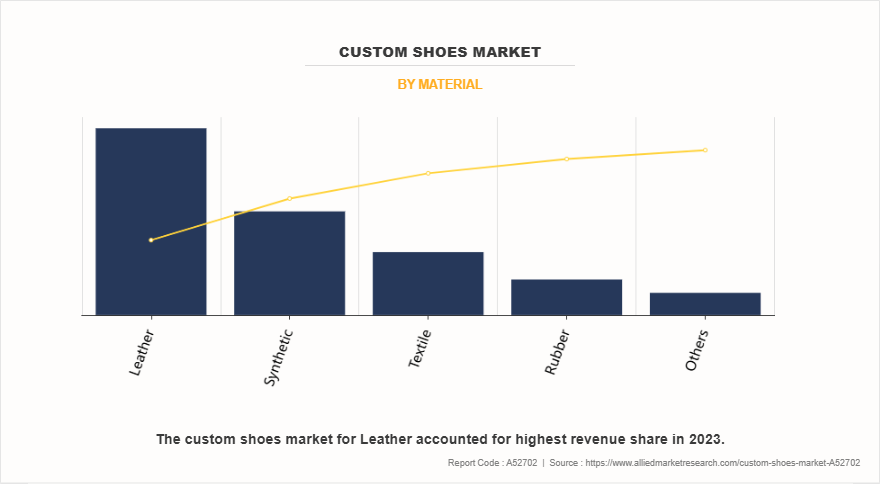
By material, leather segment dominated the global custom shoes market in 2023 and is anticipated to maintain its dominance during the forecast period. The preference for leather in custom footwear is driven owing to its durability, premium aesthetic, and ability to conform to foot shape over time. Consumers who seek high-quality, long-lasting shoes continue to favor leather, particularly in luxury and formal footwear categories. Brands are also integrating sustainable and ethically sourced leather in custom shoes category to align with evolving consumer preferences. Advancements in leather treatment processes have enhanced breathability and comfort, which has led to increased demand for custom leather shoes. Moreover, the strong presence of leather in both traditional craftsmanship and modern customization technologies ensures its continued relevance in the market.
By Distribution Channel
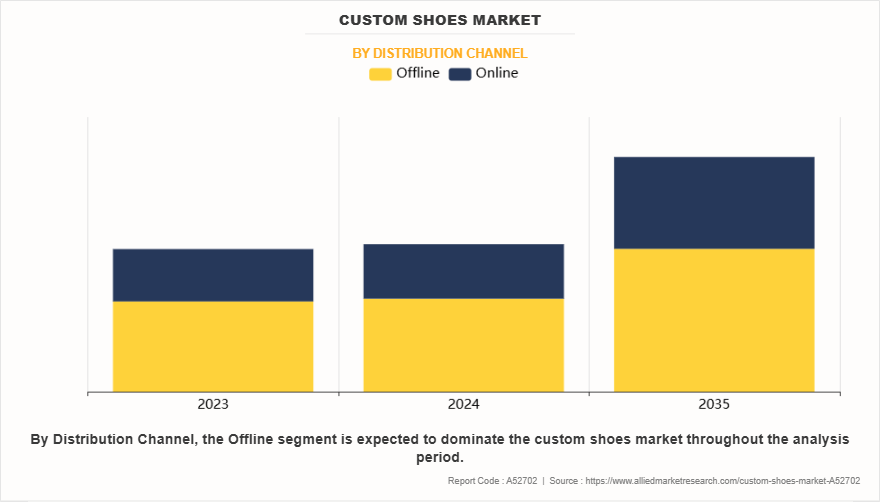
By distribution channel, offline segment dominated the global custom shoes market in 2023 and is anticipated to maintain its dominance during the forecast period. Consumers prefer offline stores for personalized fittings, material selection, and hands-on customization experiences. High-end boutiques, specialty footwear stores, and brand-owned outlets offer tailored services that enhance customer satisfaction. The ability to assess craftsmanship, receive expert guidance, and try on shoes before purchase drives demand. Established brands continue to expand their offline presence by integrating customization studios within retail spaces. Despite the growth of online channels, the offline segment remains strong due to the premium and bespoke nature of custom footwear, where in-person consultations play a crucial role in the buying decision.
By Region
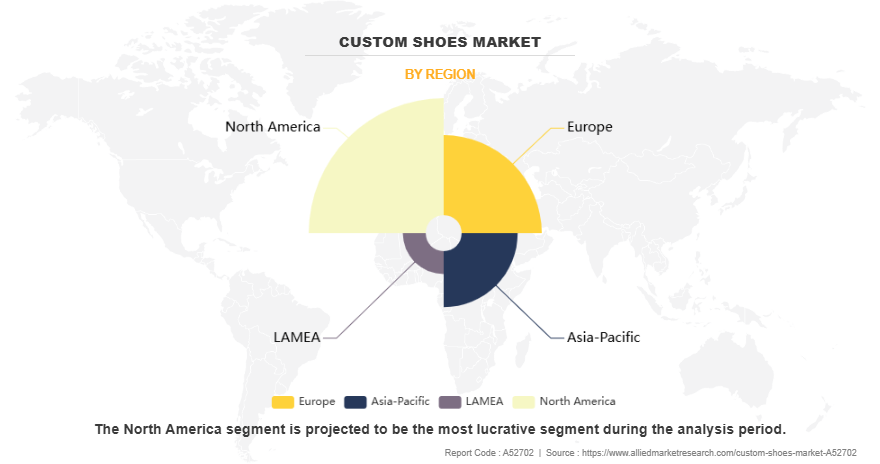
By region, North America is anticipated to dominate the global custom shoes market with the largest share during the forecast period. Strong consumer demand for personalized footwear, along with high disposable income, has driven market growth in the region. Leading brands expand customization options through exclusive retail stores and advanced digital platforms. The presence of major players that invest in AI-driven design and 3D printing technology further strengthens the market growth. A rise in interest in luxury, athleisure, and sustainable footwear among consumers supports demand for custom shoes. In addition, the well-established e-commerce sector in North America facilitates accessibility, which allows consumers to design and order personalized footwear online. Greater awareness of premium materials and craftsmanship further strengthens the custom shoes market in the region.
Competitive Analysis
The key players operating in the global custom shoes industry include Adidas AG, AliveShoes, Inc., Carmina Shoemaker, Crocs Retail, LLC, Edward Green & Co. Ltd., Italian Shoe Factory, New Balance Athletics, Inc., Nike Inc., Rancourt & Co. Shoecrafters, and VF Corporation. Several well-known and upcoming brands are vying for market dominance in the expanding custom shoes market in the region. Smaller, niche firms are more well known for catering to consumer demands and preferences in the global market. Large conglomerates, however, control most of the market and often buy innovative start-ups to broaden their product lines.
Key Benefits For Stakeholders
- This report provides a quantitative analysis of the market segments, current trends, estimations, and dynamics of the custom shoes market analysis from 2023 to 2035 to identify the prevailing custom shoes market opportunities.
- The market research is offered along with information related to key drivers, restraints, and opportunities.
- Porter's five forces analysis highlights the potency of buyers and suppliers to enable stakeholders make profit-oriented business decisions and strengthen their supplier-buyer network.
- In-depth analysis of the custom shoes market segmentation assists to determine the prevailing market opportunities.
- Major countries in each region are mapped according to their revenue contribution to the global market.
- Market player positioning facilitates benchmarking and provides a clear understanding of the present position of the market players.
- The report includes the analysis of the regional as well as global custom shoes market trends, key players, market segments, application areas, and market growth strategies.
Custom Shoes Market Report Highlights
| Aspects | Details |
| Market Size By 2035 | USD 8.6 billion |
| Growth Rate | CAGR of 4.3% |
| Forecast period | 2023 - 2035 |
| Report Pages | 398 |
| By Product Type |
|
| By Material |
|
| By Distribution Channel |
|
| By Region |
|
| Key Market Players | Adidas AG, Italian Shoe Factory, Edward Green & Co. Ltd., VF Corporation, Rancourt & Co. Shoecrafters, AliveShoes, Inc., Crocs Inc., Nike Inc., Carmina Shoemaker, New Balance Athletics, Inc. |
Analyst Review
This section consists of the opinion of the top CXO in the custom shoes market. CXOs have highlighted that the global custom shoes market is poised for significant expansion, driven by evolving consumer preferences and technological advancements. The growing demand for personalized shoes among fashion-conscious consumers and athletes presents a major growth opportunity in the global market. Advancements in AI-powered foot scanning, 3D printing, and automation have streamlined production, which is expected to make customization more scalable and accessible.
Sustainability remains a key focus, with CXOs emphasizing the shift toward eco-friendly materials and ethical manufacturing practices. Brands integrating recycled materials and biodegradable components into custom shoe offerings are expected to gain a competitive edge. The rise of direct-to-consumer business models, along with digital customization platforms, may enhance customer engagement and boost sales during the forecast period. Expanding retail networks in emerging markets and the increasing adoption of AR/VR for virtual fittings is further anticipated to strengthen market potential. CXOs also recognize collaborations with athletes, celebrities, and luxury designers as key strategies for driving premium product sales in the global custom shoes market.
The custom shoes market was valued at $5,194.3 million in 2023.
The global custom shoes market is witnessing trends such as AI-driven design, 3D printing, sustainable materials, virtual customization, direct-to-consumer models, and growing demand for unique, performance-enhancing, and eco-friendly options.
Athletic shoes segment is the leading application of Custom Shoes Market.
By region, North America is anticipated to dominate the global custom shoes market with the largest share during the forecast period.
The key players operating in the global custom shoes industry include Adidas AG, AliveShoes, Inc., Carmina Shoemaker, Crocs Retail, LLC, Edward Green & Co. Ltd., Italian Shoe Factory, New Balance Athletics, Inc., Nike Inc., Rancourt & Co. Shoecrafters, and VF Corporation.
Loading Table Of Content...
Loading Research Methodology...



